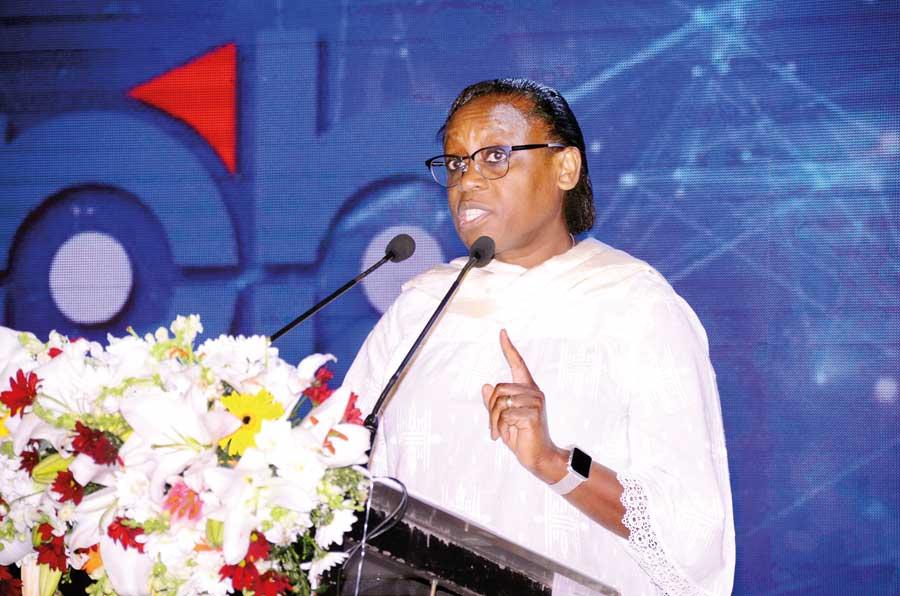Reply To:
Name - Reply Comment

Dr. Idah Pswarayi-Riddihough
Pic by Waruna Wanniarachchi
By Nishel Fernando
With nearly one-third of Sri Lanka’s adult banked population considered to be inactive account holders and many facing significant constraints in accessing finance, the World Bank (WB) urges the country’s banks to position themselves as development enablers by adopting a multifaceted approach to further promote financial inclusiveness in the country.
“Having a bank account isn’t enough; it must be used. The challenge in Sri Lanka is less about the unbanked; it is more about the underbanked, especially the women,” WB Country Director for Nepal, Sri Lanka and the Maldives Dr. Idah Pswarayi-Riddihough said.
She shared these observations delivering the keynote speech at the 31st Anniversary Convention of the Association of Professional Bankers of Sri Lanka, held in Colombo, on Tuesday.
Although around 83 percent of Sri Lanka’s adult population posses a bank account, easily surpassing its South Asian neighbours, Dr. Pswarayi-Riddihough highlighted that 31 percent of bank account holders recorded neither any deposits nor any withdrawals in 2017, while females in particular struggled to borrow from the banking sector.
“According to my colleagues from the International Finance Corporation (IFC), the number of individuals who reported no deposits and no withdrawals in 2017 was 31 percent. And only 17 percent of the women were successful in borrowing from financial institutions while, in the formal market, about 80 percent of the borrowers have been women,” she noted.
In comparison to Sri Lanka, Bangladesh had only 21 percent inactive bank account holders, while Pakistan had mere 13 percent, although the two countries had a low rate of account ownership in South Asia.
In high-income economies, only 4 percent of account owners have an inactive account.
Further, Dr. Pswarayi-Riddihough also expressed concerns on extreme low levels of insurance utilisation among businesses in the country.
According to the WB, less than 15 percent of SMEs and less than one percent of MSMEs utilise any form of insurance, exposing businesses as well as individuals to significant risks.
Moreover, the adoption of digital financial services in Sri Lanka also remains relatively slower than in other countries, despite a larger share of population having access to Internet.
According to GSMA, over 70 percent of Sri Lankans have a mobile connection with smartphone owners representing nearly 50 percent of unique subscribers in 2017. In addition, 90 percent of the population is covered with the 3G mobile network.
“We often hear that, in the case of Sri Lanka, old habits die hard. While banks are pushing the digital transformation in their sector, it seems that Sri Lankans still prefer to bank at their local branches, which are often part of their own communities. This should come as no surprise in a country where over 80 percent of the population lives in rural areas,” Dr. Pswarayi-Riddihough pointed out.
Bangladesh for an example has seen a rapid increase in mobile money accounts. In 2014, a mere 3 percent of its population had a mobile money account. However, the share jumped to 21 percent by 2017.
Moving forward, Dr. Pswarayi-Riddihough wooed banks to adopt a multifaceted approach to become development enablers in this challenging and changing environment.
“Banks can enable development through different means, such as designing innovative loan schemes for entrepreneurs, supporting financial literacy and digital ecosystems in the development of new data-driven business models and adopting exemplary sectoral guidelines and best practices regarding data governance and cybersecurity in order to improve trust in the digital economy,” she elaborated.
She reminded that banks have a critical role to play in financial inclusion, as well as in increasing access to financing for SMEs.
“Banks also have a critical role to play in supporting remittances that can fuel growth beyond consumption and help Sri Lanka leapfrog into the digitally-supported growth of tomorrow. You are part of the equation in Sri Lanka’s recent graduation into the upper-middle-income status and you will continue to be very important for the country’s future,” she went on to say.